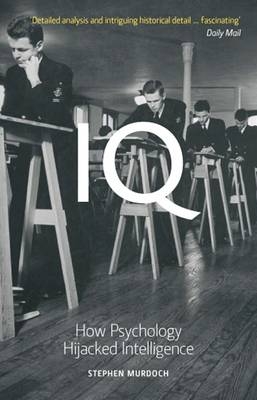
IQ
How Psychology Hijacked Intelligence
Seiten
2009
Gerald Duckworth & Co Ltd (Verlag)
978-0-7156-3447-9 (ISBN)
Gerald Duckworth & Co Ltd (Verlag)
978-0-7156-3447-9 (ISBN)
- Titel z.Zt. nicht lieferbar
- Versandkostenfrei innerhalb Deutschlands
- Auch auf Rechnung
- Verfügbarkeit in der Filiale vor Ort prüfen
- Artikel merken
How could IQ testing, which has only ever been a rough guide to ability, through the seductive power of a single, all-explaining number, have come to be seen as an objective and infallible measure of intelligence, even of human merit? This work presents history of the intelligence test.
How could IQ testing, which has only ever been a rough guide to ability, through the seductive power of a single, all-explaining number, have come to be seen as an objective and infallible measure of intelligence, even of human merit? In the first popular history of the intelligence test, Stephen Murdoch reveals how universal education, mass immigration into the US, and the demands of mobilisation in WWI, created the need to rank populations by intelligence. IQ tests were used to decide whether people could settle in a new country, whether they could reproduce, even whether they lived or died, but while they do have some predictive power, IQ tests don't explain people's capacity to think and understand the world around them. Could the concept of reshaping society based on exam results alone, ever be a good idea?
How could IQ testing, which has only ever been a rough guide to ability, through the seductive power of a single, all-explaining number, have come to be seen as an objective and infallible measure of intelligence, even of human merit? In the first popular history of the intelligence test, Stephen Murdoch reveals how universal education, mass immigration into the US, and the demands of mobilisation in WWI, created the need to rank populations by intelligence. IQ tests were used to decide whether people could settle in a new country, whether they could reproduce, even whether they lived or died, but while they do have some predictive power, IQ tests don't explain people's capacity to think and understand the world around them. Could the concept of reshaping society based on exam results alone, ever be a good idea?
Stephen Murdoch is a journalist and writer. He has contributed to "Newsweek", "Marketplace", "The Washington Post", "The Boston Globe" and other publications. Previously he was a human rights lawyer in Cambodia and practiced civil litigation in Washington. He lives in California.
| Erscheint lt. Verlag | 29.1.2009 |
|---|---|
| Verlagsort | London |
| Sprache | englisch |
| Maße | 152 x 229 mm |
| Themenwelt | Geschichte ► Teilgebiete der Geschichte ► Kulturgeschichte |
| Geisteswissenschaften ► Psychologie ► Test in der Psychologie | |
| ISBN-10 | 0-7156-3447-X / 071563447X |
| ISBN-13 | 978-0-7156-3447-9 / 9780715634479 |
| Zustand | Neuware |
| Informationen gemäß Produktsicherheitsverordnung (GPSR) | |
| Haben Sie eine Frage zum Produkt? |
Mehr entdecken
aus dem Bereich
aus dem Bereich
der stille Abschied vom bäuerlichen Leben in Deutschland
Buch | Hardcover (2023)
C.H.Beck (Verlag)
23,00 €
vom Mittelalter bis zur Gegenwart
Buch | Softcover (2024)
C.H.Beck (Verlag)
12,00 €


